Chapter 19 Community Activities
Forward planning is always very important no matter what you have in mind. It is better to plan something tentatively quite a long time in front, and then you can adjust things to the circumstances of the time. You must have a vision of the plan before you all the time.
I joined the Scottsdale Hospital Board when I was about 26. At that time at the hospital board meetings we had difficulty paying all our accounts, because we never had enough money. We were increasing our turnover, and with increasing population and rising costs, were continually short of money. Every month we could not pay the full amount of our accounts.
I asked the Chairman could we not plan in front so that we would know what we were going to spend. The chairman at that time thought it would be very doubtful. I think the board thought! was a bit of a kid, and felt it would be hopeless trying to tell the Hospital Board and the Government what they could spend.
But I got details of the last five years' expenditure and worked out that the population was increasing by a certain percentage (for example, four per cent) and costs were increasing approximately 3.8 per cent, so therefore the next year theoretically we should need so much money.
I typed this out and put it to the board, and they were happy to send it to Hobart. Luckily we were within £30 of our expenditure. I did the same thing the following year and I was almost spot on.
The Health Department and the Government were so impressed that from then on they made all hospital boards in Tasmania budget for their expenditure.
I was not always very popular, and even when, later on, I was
Chairman of the Hospital Board and we had problems with budgeting,
other board members would laugh and say, Well, you started this
scheme, so it is up to you to make sure it is correct
.
When I first joined the Hospital, the Board had a little property
where they used to milk cows for the hospital. It was about a couple
of kilometres away from the hospital and they used to pay men to drive
the cows backwards and forwards at milking time.
On behalf of the Hospital Board I wanted to buy some land adjoining the hospital to have everything close handy, and again board members thought the price wanted for the land made the proposition uneconomical. So I costed what it would take to drive the cattle backwards and forwards and how much it would cost to operate those other places which made it unnecessary to drive the cattle, and where, if a man was wanted by the Matron or Sister, she had only to put her head over the back fence and call and he would be there to help. In an emergency that was an advantage.
This proved that it was a far cheaper proposition, so the then Chairman allowed me to negotiate to buy this piece of land.
I also thought that one day the old hospital would have to be replaced and we should try to buy some land adjoining the hospital for that purpose on the western side, where it was nice and flat and enjoyed the sun all day. I felt there would be plenty of space and it would be an ideal situation.
Again it was left to me to negotiate with Mr. Rupert Foster, who had a home where we envisaged building the hospital. He was very reasonable, although he was not particularly happy to sell his home, and, although he would not suggest that I recommend it be resumed, he said if he were in my place he would recommend that the Government should commandeer the area for the sake of the district as a whole.
So I purchased the ground and also made a similar approach to Mr. and Mrs. Propsting and, although they also were not happy to let some of their land go, they agreed.
But it took us 20 years before the Government had enough money to build a hospital on the land. We bought the total ground in those times for about £3,000.
Of course, later on prices increased enormously with inflation, and had the new hospital been built on a piece of land the board bad on the side of the hill, the site chosen by the Health Department, the extra cost of building foundations on this steep ground would, according to the contractor, have been an extra quarter of a million. And not only would the cost of the new hospital have been far greater, but the space and sunlight would not have been as good. As it is, of course, Scottsdale today has one of the most beautiful hospitals in Australia.
We also had a big hand in designing the hospital for the benefit of patients and staff. The architects in those days preferred the windows to be high up, preventing anyone from looking out and enjoying the view.
Ivan Waldron, who was the secretary, I, as Chairman, and Dr. John North, as Superintendent, went to Hobart with suggestions and the Government architect accepted 29 amendments out of 32 we submitted.
One of them was that the windows be put down lower. Another was to have glass walls in the hospital, a new departure also, for there was nothing like it in Tasmania. I had seen them in China. Another innovation accepted was the carpeting of the floors. All this was the result of forward planning.
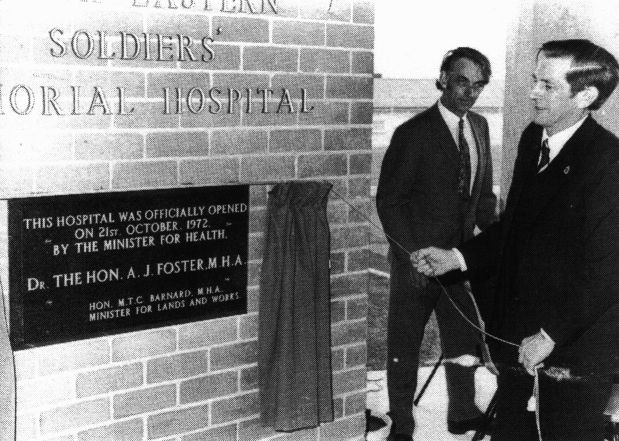
Dr Foster and I at the opening of the new hospital.
A temporary plaque was used for the opening ceremony.
Even if something appears to be unattainable, by planning ahead it is possible often to get it done, and if you have a vision and plan accordingly, its attainment becomes much easier. There is an old saying that if you reach for the moon you may miss, but you may catch a star on the way down!
When Gough Whitlam, as Prime Minister, of Australia, visited the hospital, he was very impressed with the layout of the hospital. One little item that surprised me was that when he looked at the foundation stone, he remarked that they had not spelt my name correctly. I was surprised and amazed because I had passed the plaque many times, but a person does not usually look at his own name. You automatically take note of the other names. The Board decided to correct the spelling.
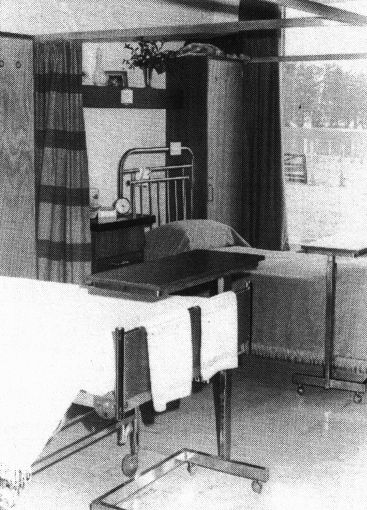
Note the low windows give patients lying in bed
a good outside view.
Dr. Allan Foster, son of Rupert, was the Minister for Health when our hospital was opened on October 21st 1972. Allan, a former Scottsdale boy unfortunately died recently of cancer. He expressed the wish to see me in Hobart. He asked me about the wonderful irrigation schemes that we were putting in. I was amazed that a man who knew he was going to die very soon could be so interested. After trying to break off the conversation, as it was tiring him, I understood he really wanted to know everything. When I jokingly said it was a frivolous occupation at my age, he said, 'Don't even say such a thing in fun. It is wonderful to be doing such a project for the future.' He was correct. It was a project for the future as I had seen similar gravitation water schemes in China, India and elsewhere that have supplied the needs of the people for hundreds and thousands of years. Of course, Allan was a fantastic individual and I doubt if I would have had the understanding and vision that he had, if I had been in like circum- stances.
In our community activities I think it is important to realise that
we have only a limited amount of money and we must try to get the best
deal possible out of one's donation. When the Sailing Qub at Bndport
was first mooted, I told the organisers that Peg and I would give $500
when they had the foundations of the building in place. And when the
club was opened, having involved an outlay of about $45,000, Graeme
Brownell, in performing the official opening, said, We would not
have got started but for the fact that we had to lay the foundations
before we could get Bert's $500
.
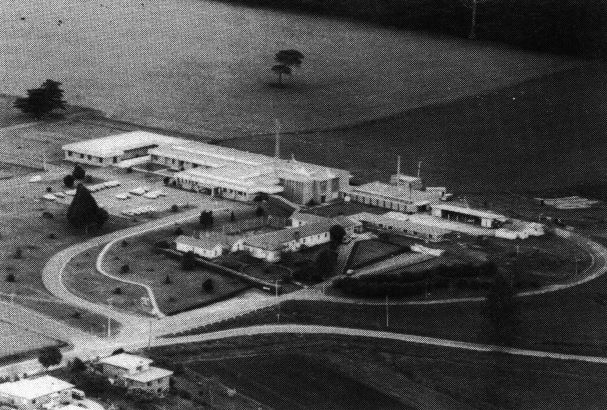
North Eastern Soldiers' Memorial Hospital.
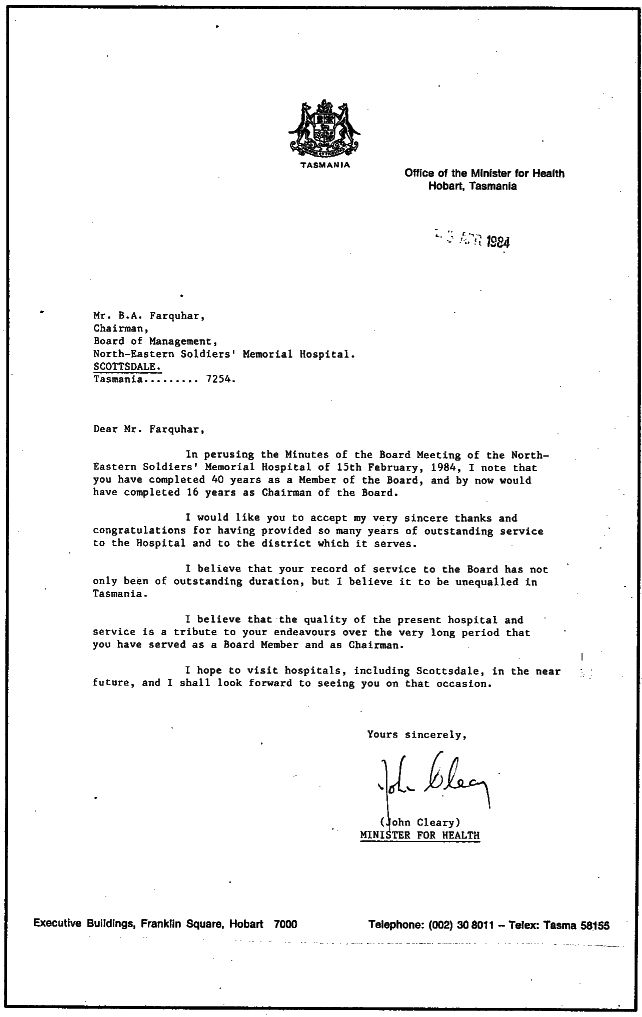
Letter from Minister for Health, Hobart, Tasmania
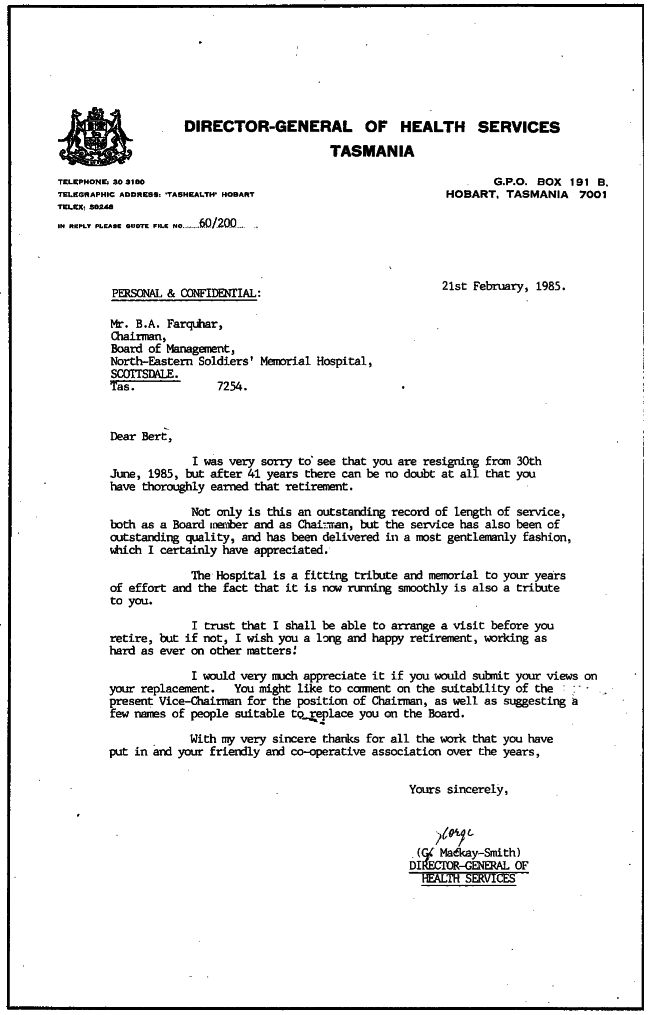
Letter from Director-General of Health Servics, Hobart, Tasmania
So it is good to put a tag on these little things. We had the same thing with Northbourne Park There had been meetings for some 20 years, according to Mr. Wilf Rose, who was the Warden, and he said it would never start. Peg and I talked it over and said we would give £250 if three others would. Kevin Haas said he would pledge £250 on behalf of Apex, Mew. McLennan offered the same amount from his Dad's estate, and Geoff. Bailey, the chemist, offered £250 from his chemist's shop. There we had £1,000. Now Scottsdale has a big complex of 40 old people's units, which is growing every day.
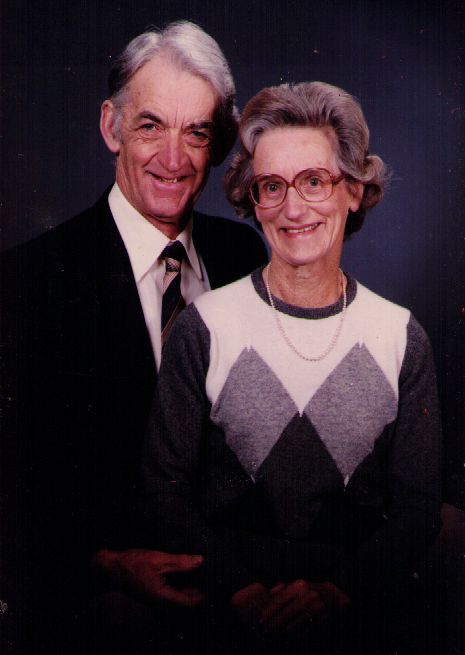
Peg and I on the occasion of the termination of 41 years
on the N.E.S.M.Hospital Board - February 1944 to June 1985.
It was just a matter of getting it started. If I had just donated £250 it would have been a reasonable donation, but because I made a stipulation that we would do so if three others guaranteed to do likewise, we had set the ball rolling with £1000, which of course, in those days, was quite a bit of money.
I have always been relatively short of money, without a lot of money to give big donations to things, so I like to ensure that my contributions produce the best results possible.
Football is a very important activity in our district. We have wonderful teams. In the last 25 years from 1964 to 1989 the Seniors have won ten N.T.F.A. Premierships, one State Premiership, and in 1989 won the N.T.F.L. Premiership.
It is a wonderful record for a small town of Scottsdale of 2,600 citizens, against all the big high-financed city clubs. I doubt if it has been equalled anywhere in Australia. I have never played competition football, but many of my staff have done so. Danny Hall, the present coach, was a past staff member.
Our son John was a very keen footballer; he used to be a mascot and was captain of his school team and later played in the under 19 team. We annually present the John Farquhar Memorial Trophy to the best and fairest in the Reserves.
This reminds me of when I took Max Lethborg, a promising young footballer to hospital, about forty years ago.
Max had been shooting and had blown the top part of his leg right off, up towards the thigh. The raw flesh showing was as big as a dinner plate and must have been very painful. Max's leg was stretched out on the back of the utility, during the ride for some six kilometres over a very rough road to the hospital. He never moaned or even flinched with the pain, so here was another very tough young man. Max exercised his leg and later continued his football career, to become one of our best footballers.
The footballers jokingly claim our winding Sideling road makes the opposition team sick. I may get some flak because I have just written to Ken Wriedt, sending plans and suggestions for a by-pass of the worst eleven kilometres of the Sideling road. I hope it does not upset their record winnings!
This alternative route will not only save millions of dollars over a period, but it will become a safer, shorter road for motorists. It is amazing that it has taken 130 years for this alternative route to be advocated, which does away with the difficult and dangerous corners on sections of the Sideling.
The following is Ken Wriedt's letter just received.
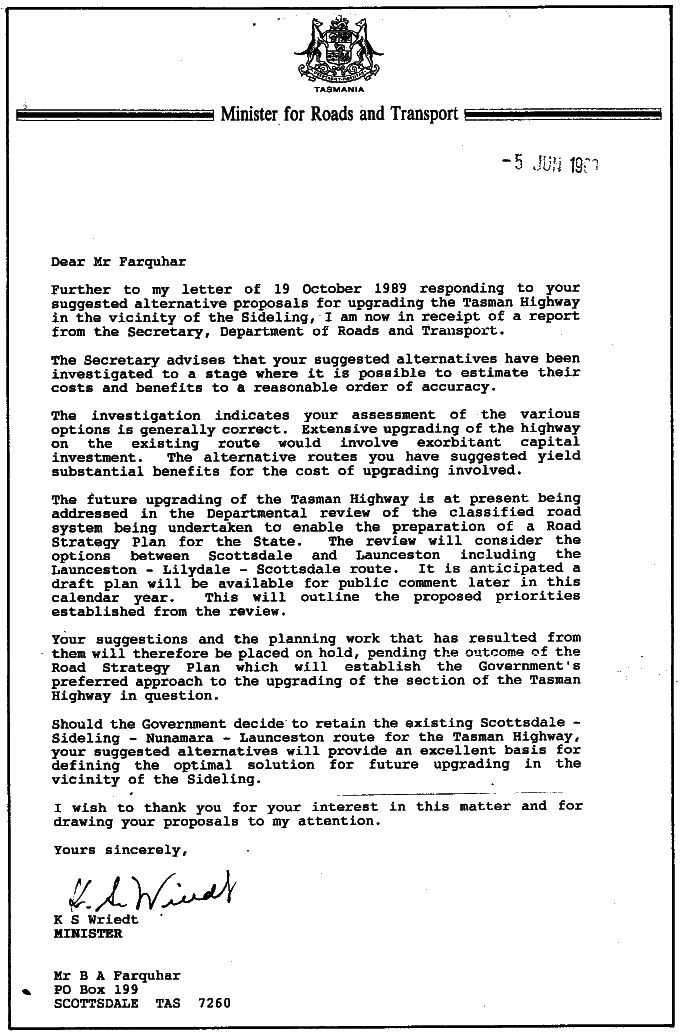
Letter from Ken Wreidt, Minister for Roads and Transport, Hobart, Tasmania